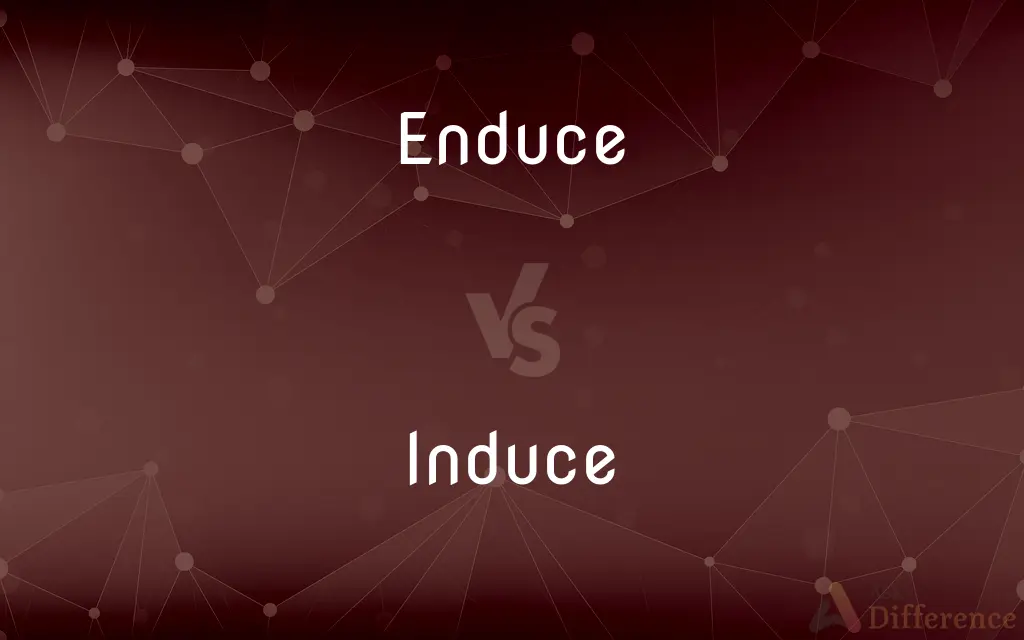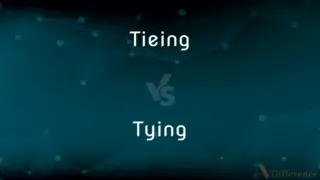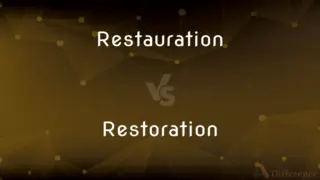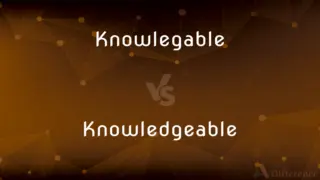Enduce vs. Induce — Which is Correct Spelling?
By Tayyaba Rehman — Updated on March 20, 2024
"Enduce" is an incorrect spelling. The correct spelling is "induce," which means to bring about or stimulate the occurrence of something.

Table of Contents
Which is correct: Enduce or Induce
How to spell Induce?

Enduce
Incorrect Spelling

Induce
Correct Spelling
ADVERTISEMENT
Key Differences
Think of "induction" to recall the correct prefix "in-".
Remember the word "industrial" which also starts with "indu-."
The prefix "en-" typically means to put into or surround, whereas "induce" means to bring about.
"In" means "into," aligning with the idea of bringing something about.
Visualize the word "introduce" without the "tro" to help remember "induce."
ADVERTISEMENT
How Do You Spell Induce Correctly?
Incorrect: They wanted to enduce labor since the baby was overdue.
Correct: They wanted to induce labor since the baby was overdue.
Incorrect: The advertisement aims to enduce people to buy the product.
Correct: The advertisement aims to induce people to buy the product.
Incorrect: Can certain foods really enduce sleep?
Correct: Can certain foods really induce sleep?
Incorrect: The company tried to enduce changes through a new policy.
Correct: The company tried to induce changes through a new policy.
Incorrect: He attempted to enduce a state of relaxation with meditation.
Correct: He attempted to induce a state of relaxation with meditation.
Induce Definitions
To cause to occur or exist.
The drug can induce sleep.
To produce (an electric current) by induction.
The coil can induce a current in the surrounding circuit.
To bring about the birth of a baby through medical or surgical means.
The doctor decided to induce labor due to complications.
To derive by inductive reasoning.
From the evidence, the detective could induce the suspect's motive.
To lead or move by persuasion or influence.
The advertisement is designed to induce people to buy the product.
Succeed in persuading or leading (someone) to do something
The pickets induced many workers to stay away
Bring about or give rise to
None of these measures induced a change of policy
Bring on (the birth of a baby) artificially, typically by the use of drugs
Induced labour
Derive by inductive reasoning
From the experimental evidence, one infers or induces the hypothesis
To lead or move, as to a course of action, by influence or persuasion.
To bring about or stimulate the occurrence of; cause
A drug used to induce labor.
To infer by inductive reasoning.
To produce (an electric current or a magnetic charge) by induction.
To produce (radioactivity, for example) artificially by bombardment of a substance with neutrons, gamma rays, and other particles.
(Biochemistry) To initiate or increase the production of (an enzyme or other protein) at the level of genetic transcription.
(Genetics) To cause an increase in the transcription of the RNA of (a gene).
(transitive) To lead by persuasion or influence; incite or prevail upon.
(transitive) To cause, bring about, lead to.
His meditation induced a compromise.
Opium induces sleep.
(physics) To cause or produce (electric current or a magnetic state) by a physical process of induction.
To infer by induction.
To lead in, bring in, introduce.
To draw on, place upon. en
To lead in; to introduce.
The poet may be seen inducing his personages in the first Iliad.
To draw on; to overspread.
To lead on; to influence; to prevail on; to incite; to persuade; to move by persuasion or influence.
He is not obliged by your offer to do it, . . . though he may be induced, persuaded, prevailed upon, tempted.
Let not the covetous desire of growing rich induce you to ruin your reputation.
To bring on; to effect; to cause; as, a fever induced by fatigue or exposure; anaphylactic shock induced by exposure to a allergen.
Sour things induces a contraction in the nerves.
To produce, or cause, by proximity without contact or transmission, as a particular electric or magnetic condition in a body, by the approach of another body in an opposite electric or magnetic state.
To generalize or conclude as an inference from all the particulars; - the opposite of deduce.
To cause the expression of (a gene or gene product) by affecting a transcription control element on the genome, either by inhibiting a negative control or by activating a positive control; to derepress; as, lactose induces the production of beta-galactosidase in Eschericia coli..
Cause to arise;
Induce a crisis
Cause to do; cause to act in a specified manner;
The ads induced me to buy a VCR
My children finally got me to buy a computer
My wife made me buy a new sofa
Cause to occur rapidly;
The infection precipitated a high fever and allergic reactions
Reason or establish by induction
Produce electric current by electrostatic or magnetic processes
Induce Meaning in a Sentence
The doctor decided to induce labor to ensure the baby's health.
Warm milk is believed to induce sleep in some people.
The experiment was designed to induce stress in participants.
The scent of lavender is said to induce relaxation.
Hypnosis can sometimes induce a state of deep calm.
Exercise can induce feelings of happiness and well-being.
Certain medications can induce drowsiness, so don't drive after taking them.
They used incentives to induce employees to work longer hours.
They hoped the new policy would induce positive changes in behavior.
Economic incentives can induce companies to invest in green technologies.
The trial aims to induce a stronger immune response through a new vaccine.
Cold temperatures can induce numbness in extremities.
The charity's campaign is designed to induce people to donate.
Storytelling can induce a profound connection between the speaker and the audience.
Bright lights can induce headaches in sensitive individuals.
A strong narrative can induce empathy for characters in a story.
The government's tax breaks are meant to induce investment in renewable energy.
Certain plants can induce allergic reactions when touched.
The drug is used to induce vomiting in cases of poisoning.
Music can induce various emotional states, from joy to sadness.
Meditation and deep breathing exercises can induce a sense of peace.
Psychological techniques can induce changes in perception and attitude.
The therapist used techniques to induce a trance-like state.
The presentation aimed to induce the board to approve the project.
Travel can induce a greater appreciation for different cultures.
Induce Idioms & Phrases
Induce someone to do something
To persuade or lead someone to perform a certain action.
The offer of a bonus induced her to take on the extra work.
Induce an effect
To cause a specific result or outcome.
The medication is known to induce side effects in some patients.
Induce a reaction
To cause a specific response or reaction.
The play's controversial theme was intended to induce strong reactions from the audience.
Induce a sense of something
To cause or bring about a particular feeling or state.
The peaceful garden induced a sense of calm throughout.
Common Curiosities
Why is it called Induce?
The term "induce" originates from the Latin word "inducere," meaning to lead in, bring in.
What is the root word of Induce?
The root is from the Latin word "inducere."
Which vowel is used before Induce?
The vowel "i" is used before "induce."
What is the pronunciation of Induce?
It is pronounced as in-DOOS.
What is the verb form of Induce?
The verb form is "induce."
Which conjunction is used with Induce?
Conjunctions are not specific to verbs, but "and" or "or" can be used in sentences containing "induce."
Is Induce an abstract noun?
No, "induce" is a verb, not a noun.
Which article is used with Induce?
The indefinite article "an" can precede "induce" when discussing the action itself, as in "an induce."
Is Induce a negative or positive word?
"Induce" is neutral; its connotation depends on context.
Which preposition is used with Induce?
"Into" can be used, as in "induce into."
Is the word Induce is Gerund?
The gerund form is "inducing."
How do we divide Induce into syllables?
It can be divided as in-duce.
What part of speech is Induce?
"Induce" is a verb.
What is the opposite of Induce?
The opposite can be "prevent" or "deter."
What is the first form of Induce?
The first form is "induce."
What is the singular form of Induce?
The singular form is "induce."
What is the plural form of Induce?
Verbs do not have plural forms in the same way nouns do.
Is the Induce term a metaphor?
Not inherently, but it can be used metaphorically in some contexts.
What is another term for Induce?
Another term is "prompt."
Which determiner is used with Induce?
Determiners like "this," "that," or "an" can be used depending on context.
Is Induce a noun or adjective?
"Induce" is a verb.
Is Induce a vowel or consonant?
"Induce" is a word, not a single letter. It contains both vowels and consonants.
Is Induce a countable noun?
"Induce" is not a noun; it's a verb.
Is the word Induce is imperative?
It can be used in the imperative mood, e.g., "Induce the reaction."
Is Induce a collective noun?
No, "induce" is not a collective noun.
What is a stressed syllable in Induce?
The second syllable "duce" is stressed.
What is the second form of Induce?
The second form is "induced."
What is the third form of Induce?
The third form is "induced."
How is Induce used in a sentence?
"The speech was intended to induce change in the community."
Is Induce an adverb?
No, "induce" is not an adverb.
Is the word “Induce” a Direct object or an Indirect object?
"Induce" is a verb. It can have both direct and indirect objects depending on sentence structure.
How many syllables are in Induce?
There are two syllables in "induce."
Share Your Discovery

Previous Comparison
Carreer vs. Career
Next Comparison
Aready vs. AlreadyAuthor Spotlight
Written by
Tayyaba RehmanTayyaba Rehman is a distinguished writer, currently serving as a primary contributor to askdifference.com. As a researcher in semantics and etymology, Tayyaba's passion for the complexity of languages and their distinctions has found a perfect home on the platform. Tayyaba delves into the intricacies of language, distinguishing between commonly confused words and phrases, thereby providing clarity for readers worldwide.













































